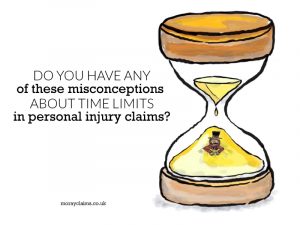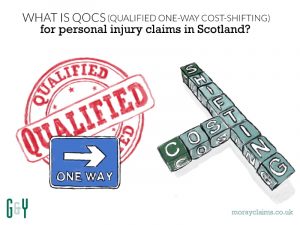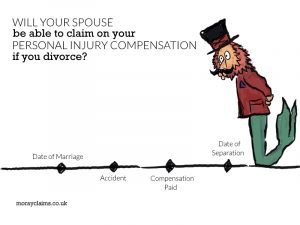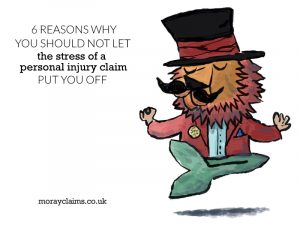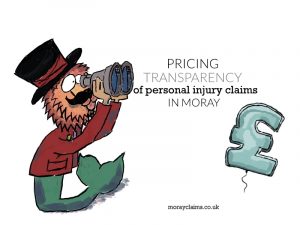“The room is full of steam from the kettle but you still make the tea.” These were words of my school chemistry teacher. What was the point? That a small volume of water produces a large volume of steam. If you put water on to boil for a cup of tea but then get distracted by something else, you may return to find the room filled with steam but there will probably still be enough water left to make your brew. This idea that you can forget about something for a while, come back to it and the outcome will still be okay seems to be one that many folk with possible personal injury compensation claims have too. The problem is that personal injury claims are up against a hard deadline. In most cases, that deadline is 3 years from the date of the accident/injury. If you don’t settle your claim by negotiation within the 3-year period, you’ll have to raise a court action to keep the claim alive beyond the deadline - or lose the right to claim forever. It’s inevitable Continue Reading
Avoiding Losing Money on Your Personal Injury Claim
Below you will find a series of articles on the Moray Claims website on the subject of “Avoiding losing money on your personal injury claim”.
There are lots of things you can do to help yourself, for example:
- maximise the value of your claim by keeping good records of outlays you incur in connection with medical treatment, travel expenses, medication and the like, so these can be fully reclaimed;
- don’t make up elements of your claim and avoid exaggeration;
- avoid hidden costs such as your solicitor or other representative levying charges against you on successful conclusion of your claim which mean the amount you actually receive is reduced when it maybe does not need to be.
What’s qualified one-way cost-shifting for personal injury claims in Scotland?
"Give me 10 men like Clouseau and I could destroy the world," These were the words of Chief Inspector Charles Dreyfus (Herbert Lom), long-suffering superior of the hilariously inept Inspector Jacques Clouseau (Peter Sellers) in the Pink Panther films of the 1960s and 70s. Another crucial supporting role to Clouseau was that of Cato Fong (Burt Kwouk – pronounced “Kwok”), the Inspector’s Chinese manservant, trained to spring regular surprise attacks on his boss to keep him alert and practised in martial arts. A prime example of Clouseau’s extreme destructive power is in one apartment scene where, with Cato’s assistance, he destroys not only a four-poster bed and a TV set but also inflicts structural damage on the flat below, occupied by the hysterically twitching Dreyfus. We could say that Burt Kwouk’s role was crucial in support of Peter Sellers’ performance. And, because we love a pun, we could also say that, in the context of personal injury claims, QOCS (which is Continue Reading
Why Personal Injury Claims are a Buyer’s Market
Water seems a rather boring substance. Ice floats in water, as you'd expect. But is that typical behaviour for substances as between their liquid and solid forms? As you cool water down, it contracts until you get to 4°C. Then it suddenly expands again and its density reduces. So, by the time water freezes to ice, you have a material which is less dense than the liquid that it’s sitting on. There is no other known molecular material which will actually float on its melt. As a comparison, if you look at the olive oil sold in a supermarket, on a relatively cold day, at the bottom of the bottle there is an off-whitish deposit. That is olive oil ice. Olive oil is a 'normal' liquid which, when it freezes, contracts. The frozen stuff goes down to the bottom. Water brainwashes us from a young age to think that when you freeze a fluid it should become a solid which goes to the surface. But water is unique in that respect. With Personal Injury Compensation Continue Reading
Personal injury compensation and divorce
Personal injury claims come with stress attached. You have the strain of the pain and discomfort from the injury, the hassle of not being able to engage in everyday activities and possibly also the worry of loss of income through not being able to work. Coping with injury puts added pressure on your relationships. Particularly your closest relationships. This can lead to relationship breakdowns, whether that is splitting up with your boyfriend or girlfriend, or separating from your spouse or civil partner. Even the strongest relationships can be undermined. Personal injuries can be physical or mental, or both. As an injured person, you may develop depressive symptoms or changes in personality. In this article, we are going to look at what Scots law says about personal injury compensation in the context of relationship breakdown. We will focus particularly on financial provision on divorce or termination of civil partnership. We'll look at the situation Continue Reading
6 reasons why you should not let the stress of making a personal injury claim put you off
We get stressed about money, reputation, safety, relationships, life changes… Life changes are a journey. And they’re journeys that usually involve stress. By the end, you're a different person. Both elements – change and stress – play their part in the transformation process. Personal injury claims are stressful. In this article, we’ll look at the nature and causes of the various stresses. Then, having considered these ‘problems’, we’ll list out the ‘solutions’ - the reasons why, nevertheless, you should go ahead with a personal injury compensation claim. Getting injured creates its own acute stress at the time. Often, there’s immediate severe pain. Beyond that, you have a loss of independence – with increased dependence on others. And also fears for the future: will you recover to full fitness? Most people seek legal representation for a personal injury compensation claim after the acute phase of the injury is over. Perhaps after you get out of hospital or after you Continue Reading
What pricing will apply to our help with your personal injury claim in Moray?
When asked about his nationality, legendary Scottish fiddler, Johnny Cunningham, liked to tell people that he was half Scottish and half Irish. This explained, he said, why half of him wanted to drink all the time and the other half never wanted to pay for it. Everyone prefers a free option if it’s realistic… …and cost is one important aspect of personal injury compensation claims. What is it that personal injury clients want? In many cases they will say that it’s about “justice”. It’s the principle of the thing. In practice, what this boils down to is questions about how much your claim is likely to be worth and how long it is all likely to take to get justice for you. From the solicitor’s point of view, the main question tends to be: “Is there a claim?” - Will we be able to prove someone caused your injury by negligence? And, of course, another important question you’ll have is: “How much is it going to cost me to get help from this solicitor? Cost Continue Reading
When being even 10 per cent to blame for your own injury is too much
“Can I buy or sell a house without a solicitor?” Grigor & Young have newspaper cuttings books back to the 19th century, and that’s how one cutting from the mid-1980s is headlined. The body text continues: “In theory, you can do much of the work yourself. In theory, you can also remove your own appendix – given a sharp knife, a reliable textbook and a bit of practice.” Seth Godin picked up on this theme of expertise in a post on his daily blog. He asked: “Okay, how hard can it be? (to be an expert). Actually, it might be very hard. Actually, expertise has value. Actually, just because someone said it on the internet doesn’t mean it’s true. Or useful.” What’s the chance you’d be able to do such conveyancing or (especially) surgery yourself? Limited, you would think. Less than 10%? Less than 1%? And a small chance is what you would expect to have, in general, if you were hoping to overturn a finding of 10% contributory negligence in a personal injury Continue Reading
Don’t let your personal injury claim get thagomized (by getting a move on now)
Do you know what a thagomizer is? The thagomizer is an arrangement of 4 to 10 spikes on the tails of dinosaurs such as the Stegosaurus. The pointy bits provided a defensive weapon against predators. Stegosaurus was a herbivore. With a toothless beak and small teeth, it was not designed to eat flesh. Legendary cartoonist, Gary Larson, coined the term ‘thagomizer’ in his 1982 image of a caveman giving a PowerPoint presentation to colleagues and telling them it was so-called “after the late Thag Simmons”. Poor Thag. ‘Thagomizer’ has come to be adopted as an informal anatomical term. It’s used on the Stegosaurus display at the Smithsonian Institute in Washington D.C.. Clearly, Stegosaurus had a mighty sting in the tail, if required. Personal injury claims can have a sting in the tail too, if you don’t watch out. The cruel defence is one of ‘delay’. Wait too long and your claim will become unenforceable and lost forever. As we have discussed elsewhere, the Continue Reading
How to avoid throwing money away on your personal injury claim
Scottish solicitors’ firms have to do formal risk management training every year. This is particularly to minimise the risk of making mistakes which might mean we end up getting sued because of losses we might cause to our clients. We had a recent session in our Elgin office where the “system” to assess risks in our work on a daily basis was summarised as: Stop and think Do as you have been told (i.e. we have a lot of systems and procedures already for managing risk) Repeat one and two Everything looks clear with hindsight. You want to avoid looking back on things with regret, if possible. It can be especially annoying if, due to not “stopping and thinking”, you make a silly error which results in a loss to you personally or to your workplace. It’s a bit like that with personal injury claims and, from our perspective, there is an avoidable mistake many injured people make at the start of their personal injury claim. It causes financial loss to them. It’s not obvious, though, Continue Reading
Should you accept the insurers’ first offer?
Sylvester Stallone’s big break as a movie star came with the 1976 film, Rocky. However, his own story is as inspirational as that of the boxer he played on screen. Stallone had a troubled upbringing, spending a lot of time in foster care. In his 20s, at one point, he was so hard up that he had to sell his dog. He wrote the first draft of Rocky after watching a boxing match in which an unknown and unfancied fighter lasted a full 15 rounds against world champion, Muhammad Ali. Film studios were very interested in the script but not with Stallone in the starring role. Nevertheless, he held out. Even when one studio offered him $325,000 for the script alone - at that time, the highest amount ever offered for a script – he did not waver. In the end, he got his wish. The purchase price for the script was only $35,000 (and the movie was reduced to a low budget production) but Stallone got the lead role. Rocky was a massive hit, winning an Oscar for best picture - and Continue Reading
Why fraudulent personal injury claims are not more likely to appear in Scotland than elsewhere
“Idiot insurance scammer fails miserably with fake ‘ice on floor’ fall”. That was one description of 57-year-old New Jersey man Alexander Goldinsky’s apparent attempt to stage a “slipping on ice cubes” accident in his work canteen. The incident – which happened sometime in the second half of 2018 - was captured on CCTV. Allegedly, he then filed a false insurance claim for the ambulance service and treatment he received at a local hospital for his "injuries" and the outcome was that he faced a criminal prosecution for fabricating the claim. Clearly, the USA is not Scotland but did you know that... ...within the UK, Scottish personal injury claimants are most likely to put forward exaggerated or fraudulent claims? This view has been expressed in the legal press by solicitors whose job it is represent the interests of insurers in defending personal injury compensation claims. Reforms to the law in England and Wales have meant that, in some claims where the injured person has Continue Reading
Can insurers change their mind about settling your claim (if liability is admitted)?
Some say The Blue Nile are the greatest ever Scottish band. Though they only ever released 4 albums - between 1984 and 2004 - they maintained a consistently high standard throughout. Their music has a spare, cinematic quality which blends perfectly with Paul Buchanan’s soulful and world-weary voice. The Blue Nile’s 1989 release, Hats, has topped some polls to find the best Scottish album of all time. I listened to that album a lot when it came out - I was a student then - and I still listen to it often even now. The fact is, they almost never got a recording contract at all and took an unusual route to achieve that end. Around 1983, a top-of-the-range Glasgow-based hi-fi company called Linn Products found that their equipment’s sales prospects were boosted if they used music from the band’s demo tape when demonstrating Linn’s music systems to potential customers. When Linn discovered The Blue Nile were unsigned, they decided they would sort them with a record deal by Continue Reading
